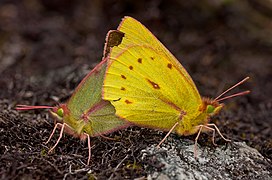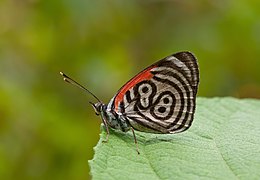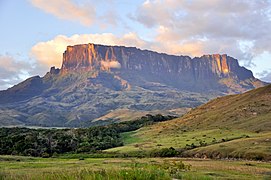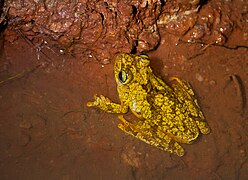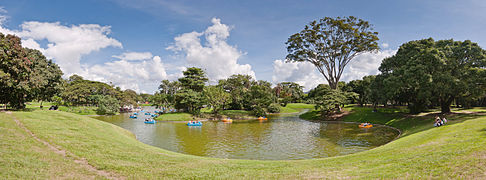Portal:Venezuela
The Venezuela Portal Venezuela, officially the Bolivarian Republic of Venezuela, is a country on the northern coast of South America, consisting of a continental landmass and many islands and islets in the Caribbean Sea. Venezuela comprises an area of 916,445 km2 (353,841 sq mi), and its population was estimated at 29 million in 2022. The capital and largest urban agglomeration is the city of Caracas. The continental territory is bordered on the north by the Caribbean Sea and the Atlantic Ocean, on the west by Colombia, Brazil on the south, Trinidad and Tobago to the north-east and on the east by Guyana. Venezuela is a presidential republic consisting of 23 states, the Capital District and federal dependencies covering Venezuela's offshore islands. Venezuela is among the most urbanized countries in Latin America; the vast majority of Venezuelans live in the cities of the north and in the capital. Economic shocks in the 1980s and 1990s led to major political crises and widespread social unrest, including the deadly Caracazo riots of 1989, two attempted coups in 1992, and the impeachment of a President for embezzlement of public funds charges in 1993. The collapse in confidence in the existing parties saw the 1998 Venezuelan presidential election, the catalyst for the Bolivarian Revolution, which began with a 1999 Constituent Assembly, where a new Constitution of Venezuela was imposed. The government's populist social welfare policies were bolstered by soaring oil prices, temporarily increasing social spending, and reducing economic inequality and poverty in the early years of the regime. However, poverty began to rapidly increase in the 2010s. The 2013 Venezuelan presidential election was widely disputed leading to widespread protest, which triggered another nationwide crisis that continues to this day. Venezuela has experienced democratic backsliding, shifting into an authoritarian state. It ranks low in international measurements of freedom of the press and civil liberties and has high levels of perceived corruption. (Full article...) Selected article - Venezuela Neutral No statement Recognize Guaidó Support opposition National Assembly Recognize Maduro During the Venezuelan presidential crisis concerning the legitimate President of Venezuela, reactions and responses to the crisis were greatly divided. On 10 January 2019, Venezuela's opposition-majority National Assembly declared that incumbent Nicolás Maduro's 2018 reelection was invalid, and its president, Juan Guaidó, said that he was prepared to assume the acting presidency. On 23 January 2019, Guaidó and the National Assembly declared he was acting president, who took the presidential oath. By vote of the opposition coalition that had previously supported Guaidó's claim, the Guaidó interim government dissolved on 5 January 2023. (Full article...)Selected picture
The San Carlos de la Barra Fortress is a seventeenth century star fort protecting Lake Maracaibo in Venezuela, one of a number of coastal fortifications built by the Spanish in colonial times. It was built in 1623 with limestone rocks, brought from the Island of Toas, at the entrance to the Maracaibo bar.
Selected biography -Juan Gerardo Antonio Guaidó Márquez (born 28 July 1983) is a Venezuelan opposition politician. He belonged to the social-democratic party Popular Will, and was a federal deputy to the National Assembly representing the state of Vargas. On 23 January 2019, the National Assembly declared that he was acting president of Venezuela (Spanish: Presidente encargado de Venezuela) and Guaidó swore himself into office, starting the Venezuelan presidential crisis by challenging Nicolás Maduro's presidency. In December 2022, opposition parties voted to dismiss Guaidó as interim president, choosing Dinorah Figuera as a successor on 5 January 2023 and ending Guaidó's presidential claim. Guaidó's political career began when he emerged as a student leader in the 2007 Venezuelan protests. He then helped found the Popular Will party with Leopoldo López in 2009, and was elected to be an alternate deputy in the National Assembly one year later in 2010. In 2015, Guaidó was elected as a full-seat deputy. Following a protocol to annually rotate the position of President of the National Assembly among political parties, Popular Will nominated Guaidó for the position in 2019. (Full article...)In this month...
Did you know (auto-generated) -
Selected list -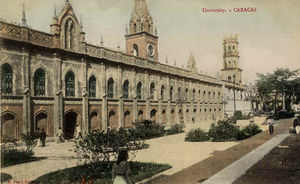 Venezuela has a wide array of universities, offering courses in a broad variety of subjects, spread between a total 23 public and 24 private universities located across several states. As a result of a Royal Decree signed by Philip V of Spain, the Central University of Venezuela—the country's oldest—was founded in 1721 as "Universidad Real y Pontificia de Caracas". The campus was originally at the now-known "Palacio de las Academias" but, in 1944, president Isaías Medina Angarita relocated it to the University City of Caracas. The second oldest university is the University of the Andes. Established in 1810 as the "Real Universidad de San Buenaventura de Mérida de los Caballeros", its origins date back to 1785 when Fray Juan Ramos de Lora founded a priest school in the city of Mérida. The University of Zulia—the third-oldest university—was founded in 1891 when the Federal College of Maracaibo was converted into a university. The government ordered the closure of the university for political reasons in 1904, and it remained closed until 1946. The University of Carabobo is the last to be founded before the twentieth century by being established in 1892 and dating back to 1833 when the College of Carabobo was created by presidential decree. (Full article...)Current events
More did you know...
TopicsCategoriesRecognized content
Featured articlesGood articles
Featured pictures
New articlesThis list was generated from these rules. Questions and feedback are always welcome! The search is being run daily with the most recent ~14 days of results. Note: Some articles may not be relevant to this project.
Rules | Match log | Results page (for watching) | Last updated: 2024-05-10 22:03 (UTC) Note: The list display can now be customized by each user. See List display personalization for details.
Things you can doWikiProjects
Related portalsAssociated WikimediaThe following Wikimedia Foundation sister projects provide more on this subject:
Discover Wikipedia using portals |






